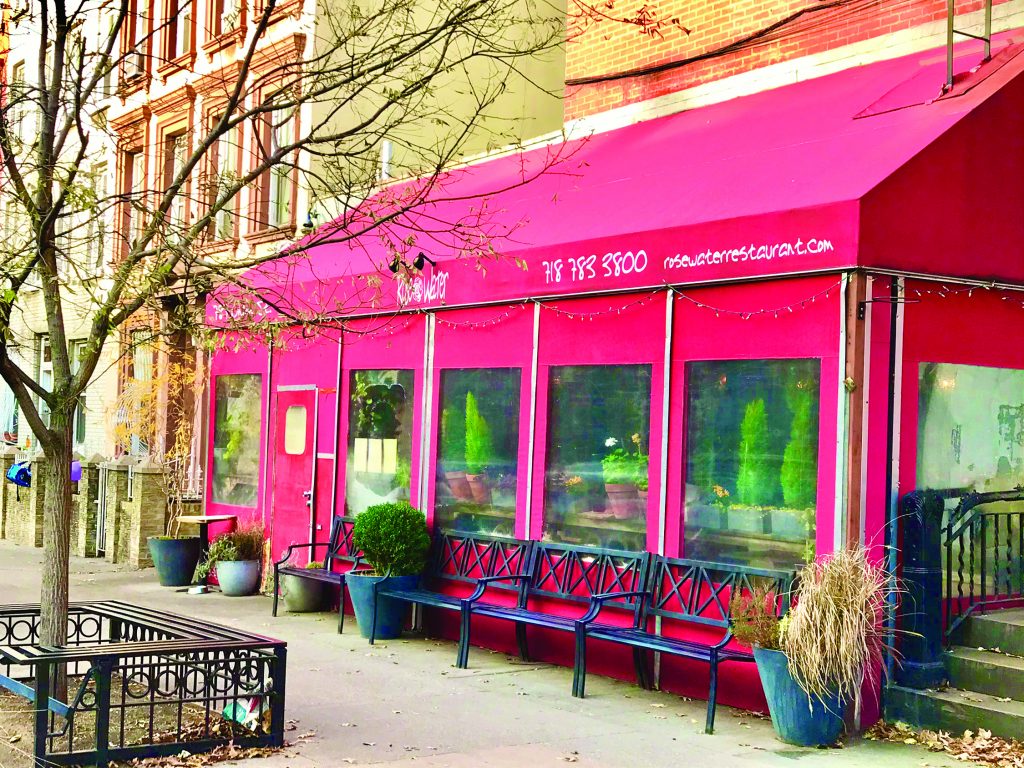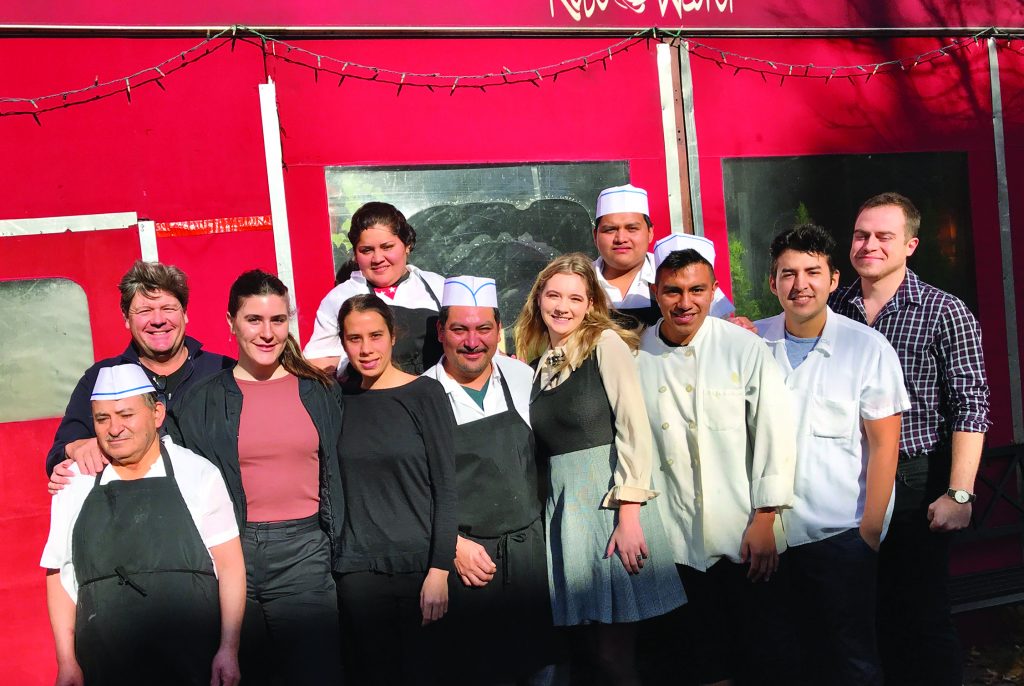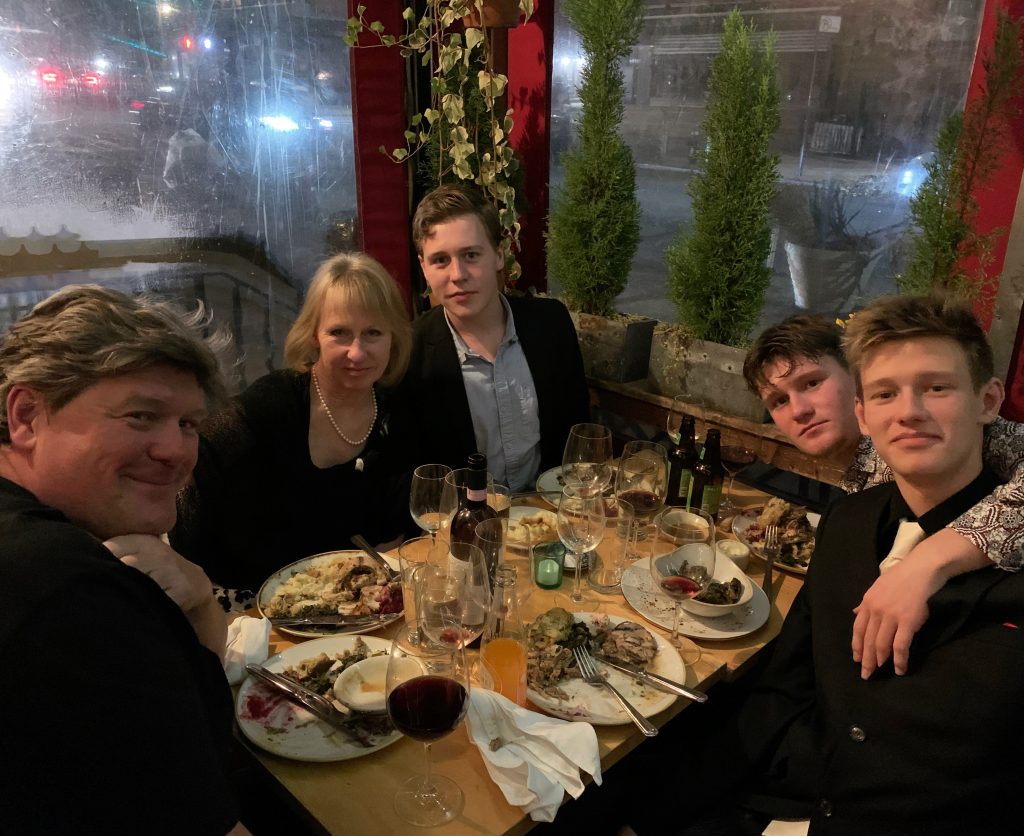
Tucker long knew that the day would come where he would choose to walk away from Rose Water. He always knew that he wanted to walk out in front, by way of his own decision. He wanted to make the announcement himself, have people come and share a last meal and reflect on old memories, and, in his own words, “ride off into the sunset.”
I met John Tucker, the owner of Park Slope’s Rose Water, in the restaurant’s candlelit dining room, right as the neighborhood farm-to-table spot was gearing up for the night’s dinner crowd. Tucker had just gotten off a plane from California, for a trip that sounded like it was meant to serve as time off from work duties. But as it goes for most restaurant owners, there’s no such thing as a break – something that is especially true at a place like Rose Water.
“The minute I got off the plane, I had to spend a lot of time updating our wine list, because we use these small producers that have bottles constantly coming and going and beer list changes,” said Tucker. “Then we needed to make menu changes because of the seasonal shift as stuff from late summer and fall start to go out of season. As opposed to a place where not much changes, this place is changing constantly. And that requires a tremendous amount of work.”
For nearly two decades, Rose Water has been serving sustainable, seasonal, American fare to locally minded diners who seek a break from routine. In this time, both Rose Water customers and staff have born witness to cycles of life and neighborhood changes: When Rose Water opened, it was one of few restaurants in the neighborhood. Today, all sorts of restaurants dot the streets throughout central Brooklyn, making the question of how to choose a restaurant far more difficult than asking where there might be one.
Two decades ago, Tucker’s youngest son had not been born yet. In the time since, he has worked at Rose Water (alongside Tucker’s other two children), and this spring, he will graduate from high school. Similarly, some Rose Water customers first came with new babies in tow, who are now unrecognizable, as young adults coming in for a meal without their parents. Others guests are no longer with us, but still, somehow, the restaurant has continued to preserve the legacy of memories made with them.
All of that came to an end, or perhaps just an indefinite respite, on Thanksgiving Day this year, when Rose Water shuttered its doors, sharing a last meal among longtime customers and family.
Tucker–who also doubled as the restaurant’s general manager–announced the decision to close Rose Water in September, with about eight weeks’ notice ahead of its last day in business. It was by no means an easy decision for Tucker, who spent weeks deliberating the choice with his family. Nonetheless, the choice to close somehow felt right for a variety of reasons.
“We move through this life, we change, and we need to recognize when it’s time to run with that when it feels like the right thing to do, and to reflect on that and act on it. I’m almost 61 and I just don’t have the same energy as when I started,” said Tucker.

Rose Water opened its doors in August of 2000. At the time, Tucker had just finished a stint as general manager at Soho’s Savoy, a well-known pioneer in New York’s farm-to-table scene. Partnering with Savoy’s head chef, Tucker went on to establish Rose Water, at 787 Union Street. Intended to be an elevated, greenmarket driven neighborhood spot without the stuffiness of fine dining, Rose Water spearheaded the concept of casual yet consciously sourced dining in Brooklyn.
Though this balance of neighborhood familiarity and attention to detail brought Rose Water a great deal of success for the better part of the last two decades, the balance between its small scale and complexity proved difficult to sustain. Both the food and wine menus at Rose Water were constantly changing, because the restaurant utilizes small producers whose inventory is also constantly in flux. When the seasons changed, so did the produce that came in. And though Tucker had been able to count on a number of staff members who had been working at Rose Water nearly since its very beginning, he didn’t have a person in a manager role to lean on. He was the one that took care of liaising with wine producers and farmers, as well as leading his staff. He was also often found working one of the serving rotations or on door duty. The result was a work-life balance that skewed heavily toward the former.
“We were trying to do something that wasn’t hyper fussy, but super well-considered in terms of where our product comes from, trying to use all sustainable meats, going organic when possible when it comes to produce. For the size of the place, we tried to have a well-curated list of natural wines that included producers from around the world. With the level of what we were trying to do, a lot of work went into that, and doing it basically by myself as the manager, that’s a lot,” said Tucker.
Though the exhaustion of running a restaurant is one reason that Tucker was seeking to move on, there was certainly a financial component as well. In recent years, Rose Water had become less profitable than it once was, something that Tucker chalked up to a few potential explanations. Although there was once a reliable dining out culture that was centered particularly on local modern American cuisine, this trend has shifted: people are increasingly ordering takeout, and aren’t eating out as much. Those who are interested in food have taken that interest to their own kitchens, an outgrowth of “foodie” culture where preparing more gourmet meals at home supplants going out to restaurants.
“It’s become more expensive to eat out for a variety of different reasons,” said Tucker. “That has everything to do with rent and minimum wage–things that are good reasons. I also believe that people who are interested in food have learned how to cook. Stores like Union Market or the Park Slope Food Co-op, which is as popular as ever, and Whole Foods, are now places where you can go in and buy not only quality ingredients, but a vast array of spices and all sorts of things.”
Competition is another factor as to why running a restaurant in Brooklyn has grown more difficult. In 2000, there were very few dining options across central Brooklyn, so if people wanted to eat out and lived in Prospect Heights, Crown Heights, or Windsor Terrace, they’d likely flock to places like Rose Water or al di la Trattoria, rarities in the then-restaurant desert of Brooklyn. But today, Brooklyn is filled to the brim with a diverse selection of places to eat. There are fewer reasons for people in neighborhoods surrounding Park Slope to leave for dinner.
Despite the decision to close has certainly been bittersweet for Tucker, he’s looking forward to enjoying nights and weekends off for the remainder of his work life. He’s chosen to leave the restaurant industry altogether, and has taken up a position at a nonprofit youth soccer program that he’s been volunteering at for the last decade. Tucker won’t be doing the coaching, but will instead, be taking his leadership skills to helping grow the business side of the organization. Though Tucker has been offered a full-time position there on numerous occasions, he’s always had to decline. He was busy, after all.

As for the Rose Water storefront itself, Tucker disclosed that a few longtime employees are looking into pursuing another project with the space.
“With any luck they’ll be carrying on doing something,” said Tucker. “It won’t be exactly the same, but it might involve parts of Rose Water and parts of the name–we’ll see. They’ve got some bridges to cross first. If they’re not able to do something with it, chances are, I’ll just empty the place out and walk away. I have some time on my lease, but I’ve chosen not to negotiate another term or finish out that last year.”
Tucker long knew that the day would come where he would choose to walk away from Rose Water. He always knew that he wanted to walk out in front, by way of his own decision. He wanted to make the announcement himself, have people come and share a last meal and reflect on old memories, and, in his own words, “ride off into the sunset.” It’s by no means been easy, but as it always has, the show must go on until that meal.
“It’s been a lot of grief for me. And I’ve had to wall off some of the emotions. But my plan is to have my family of five be the last table to sit down for a meal on Thanksgiving, if we can do it, that is. Who knows? We might end up at Wendy’s.”
